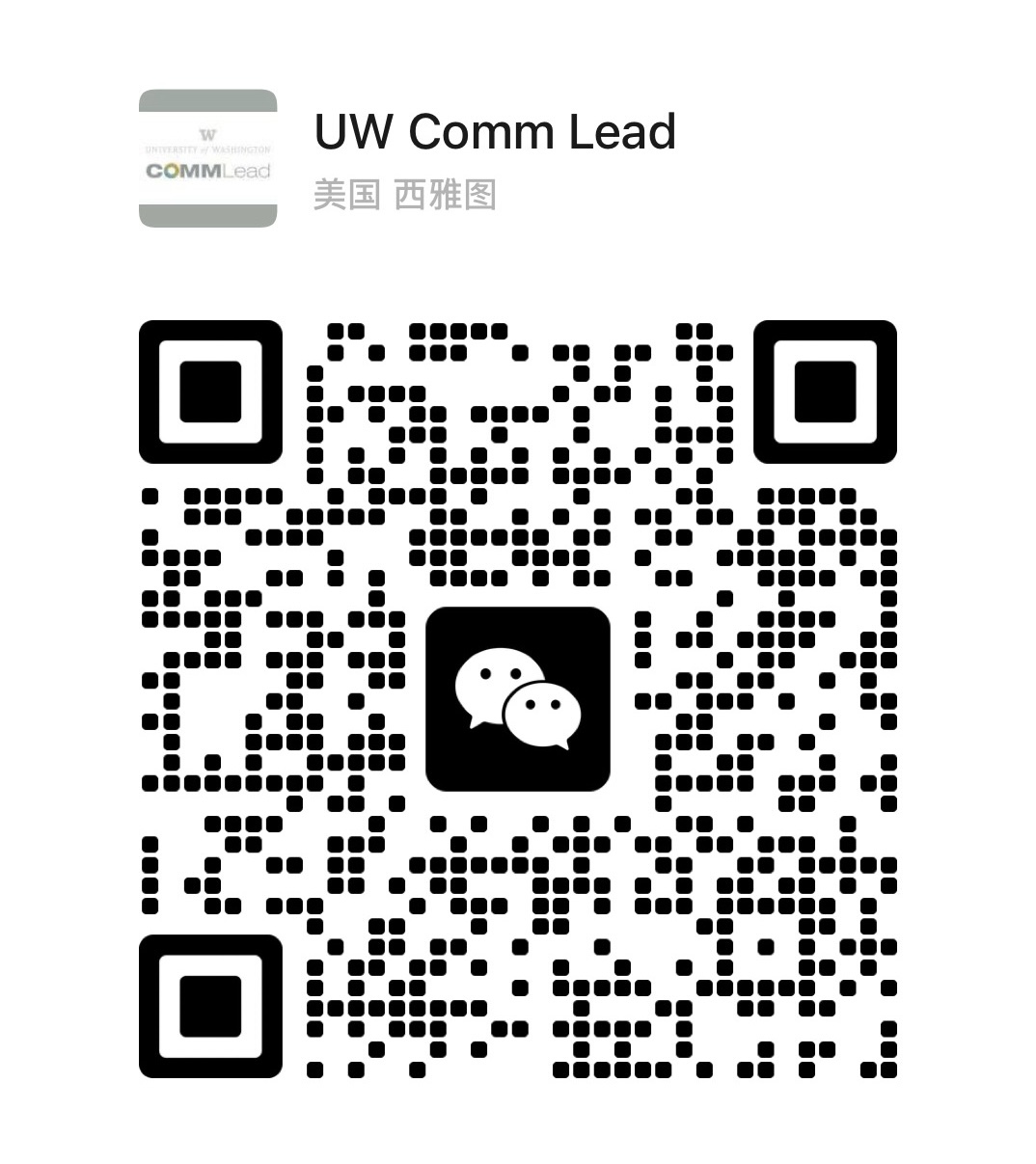Earning The Degree
Course Formats
Communication Leadership offers all classes at the University of Washington-Seattle campus on weekday evenings or all-day on Saturdays or Sundays to support the schedules of our working professionals. You can choose to attend the program full-time or part-time each quarter as your needs change.
Starting the Program
Every autumn quarter, you will get to know the other students starting the program with you as part of the required introductory COMMLD 501 class. From there, you’ll have a choice of electives to explore.
The admission application deadline is February 1st each year. See the full details on How to Apply.
Timeline
Most part-time students take between two and three years to complete the 45-credit degrees. Part-time students can complete the 60-credit Master of Communication in Communication Leadership in three to four years.
Full-time students can complete the 45-credit degrees in 15-18 months. Full-time students can complete the 60-credit Master of Communication in Communication Leadership in two years.
International students must maintain a minimum of 10 credits per quarter, with the exception of their final quarter or annual vacation quarter.
Graduating
During your final quarter of classes, you must submit a master’s request in order to earn your degree. The master’s request is submitted anytime between the first and last days of instruction, per UW Graduate School deadlines.
Degrees typically post to transcripts within two to four weeks after final quarter grades are posted, and diplomas are mailed three to four months later.
Communication Leadership celebrates graduates with the rest of the University of Washington graduation ceremonies once per year in June, for all students who earned their degrees during the prior academic year.
Specializations: Focus Your Degree
The Communication Leadership program helps you take your career in many different directions. We offer eight areas of specialization to help you focus your studies towards a specific career goal. Current class offerings can be filtered by specialization on the Classes page.

Content Strategy & UX
This specialization focuses on the skills you’ll need for a career in user research, user experience, and content strategy.
Electives you will take on this track relate to content and product strategy for organizations and brands, user research, data science, and user experience and brand development.
Job Titles: Content Strategist, UX Designer, User Experience Researcher
Sample Courses: Introduction to User Centered Design; User Research and UX Strategies; Decision Science and Content Strategy

Marketing & Branding
In this specialization, you’ll focus on how organizations connect with their audiences through content, set goals, and build and measure their brand effectiveness.
Electives in this area include everything from emerging technology used in marketing strategies, to data science, marketing copywriting, and brand development.
Job Titles: Marketing Manager, Brand Manager, Engagement Analyst
Sample Courses: The Future of Marketing; Copywriting Fundamentals for Marketing; Brand Values and Creativity

Storytelling
All institutions, movements, and leaders require a strong narrative. This focus area suits students who are interested in producing the stories that help to define and promote organizations.
This focus area includes electives on video and audio storytelling classes, as well as courses on storytelling for organizations and businesses.
Job Titles: Chief Storyteller, Videographer
Sample Courses: Foundations of Video Storytelling; Storytelling and Communication for Mission-Driven Organizations; Foundations of Audio Storytelling

Organizational & Professional Communication
For students interested in driving internal communications and institutional protocols, this focus area is designed to build your core competencies and ability to create change in an organization.
You’ll learn the best practices for internal and external communication, diversity and inclusion communication strategies for organizations, as well as change management.
Job Titles: COO, Program Operations, Diversity Officer
Sample Courses: Leadership Approaches to Equity Initiatives in Organizations; Crisis Communication; Distributed and Diverse Teams

Ethics & Law
Since our inception, Communication Ethics and Law has been a core requirement of the program. This specialization is for those who want to more deeply explore the connections between ethical behavior and communications.
You will take classes from this area in digital media law, crisis communication, and the law and ethics of community building.
Job Titles: Crisis Communication Manager, Risk Assessment
Sample Courses: Law, Data, and Privacy; Ethical Questions of Big Data; The Law and Ethics of Community Building

Communication & Culture
This specialization focuses on understanding community dynamics, motivation, and sustained change for advocacy, community-building, and leadership.
The courses in this focus area include civic advocacy movement-building, ethnography, and individualized research.
Job Titles: Community Organizer, Brand Ethnographer, Researcher
Sample Courses: Qualitative Research in Communities and Organizations; Communication for Advocacy; Communication for Change Management

Community & Leadership
Community and Leadership specialization will provide insight into careers that involve leadership development, training, and thought leadership.
Elective choices explore leadership attributes, such as how leaders cultivate strong listening habits and how leaders successfully transmit their ideas to their audiences.
Job Titles: CEO, Executive Director
Sample Courses: Digital Cross-Cultural Storytelling for Leadership and Global Networking; Listening and Leadership; Institutional Imperative, Communication, and Stakeholder Mindset

Emergent Technologies & Trends
In every graduate program, there is a subset who are the early adopters, the explorers, and the futurists.
This specialization is a collection of classes that explore the near horizon, keeping you ahead of challenges in Artificial Intelligence, or the implications of Big Data and privacy.
Job Titles: Futurist, Market Researcher, Tester
Sample Courses: Communicating Trust and Credibility for Emerging Technologies; Storytelling for Emergent Platforms; Techwashed: Technology, Hype, Truth, and Ethics in the Age of AI
Listing Your Specialization
These are not formal concentrations and do not appear on a transcript, but are ways to guide and focus your studies. Completion of a minimum of 15 credits in a specialization warrants claiming that specialization on your resume.
For one specialization:
Master of Communication in Digital Media, University of Washington, March 2022
Specialization in Marketing & Branding
For more than one specialization:
Master of Communication in Communities and Networks, University of Washington, March 2022
Specializations in Storytelling and Organizational & Professional Communication
Sample Schedules
Full-time Student – Digital Media or Communities and Networks
We recommend full-time students avoid holding full-time jobs while enrolled. International students attending on an F-1 student visa are required to maintain full-time enrollment status.
Option 1: Graduate in Winter (March)
| Autumn Year 1: 10 credits | Winter Year 1: 10 credits | Spring Year 1: 10 credits | Summer Year 1: Vacation Quarter | Autumn Year 2: 10 credits | Winter Year 2: 5 credits |
|---|---|---|---|---|---|
| COMMLD 501 Leadership and Communities (2) | Specialization Elective (5) | COMMLD 502 Narratives and Networks (3) | Internship Experience (optional) | Specialization Elective (5) | Specialization Elective (5) |
| Track Neutral Elective (3) | Research Methods (5) | COMMLD 503 Practicum (2) | Law and Ethics (5) | ||
| Specialization Elective (5) | Specialization Elective (5) |
Option 2: Graduate in Autumn (December)
| Autumn Year 1: 10 credits | Winter Year 1: 10 credits | Spring Year 1: 10 credits | Summer Year 1: 5 credits | Autumn Year 2: 10 credits |
|---|---|---|---|---|
| COMMLD 501 Leadership and Communities (2) | Specialization Elective (5) | COMMLD 502 Narratives and Networks (3) | Specialization Elective (5) or COMMLD 593 Internship (5) | Specialization Elective (5) |
| Track Neutral Elective (3) | Research Methods (5) | COMMLD 503 Practicum (2) | Specialization Elective (5) | |
| Specialization Elective (5) | Law and Ethics (5) |
Part-time Student- Digital Media or Communities and Networks
Many of our part-time students hold full-time jobs while pursuing their degree.
Option 1: Summers Off (3 years)
| Autumn Year 1: 5 credits | COMMLD 501 Leadership and Communities (2) | Track Neutral Elective (3) |
| Winter Year 1: 5 credits | Research Methods (5) | |
| Spring Year 1: 5 credits | COMMLD 502 Narratives and Networks (3) | COMMLD 503 Practicum (2) |
| Summer Year 1: Vacation Quarter | ||
| Autumn Year 2: 5 credits | Law and Ethics (5) | |
| Winter Year 2: 5 credits | Specialization Elective (5) | |
| Spring Year 2: 5 credits | Specialization Elective (5) | |
| Summer Year 2: Vacation Quarter | ||
| Autumn Year 3: 5 credits | Specialization Elective (5) | |
| Winter Year 3: 5 credits | Specialization Elective (5) | |
| Spring Year 3: 5 credits | Specialization Elective (5) |
Option 2: Attend Continuously (2.5 years)
| Autumn Year 1: 5 credits | COMMLD 501 Leadership and Communities (2) | Track Neutral Elective (3) |
| Winter Year 1: 5 credits | Research Methods (5) | |
| Spring Year 1: 5 credits | COMMLD 502 Narratives and Networks (3) | COMMLD 503 Practicum (2) |
| Summer Year 1: 5 credits | Specialization Elective (5) | |
| Autumn Year 2: 5 credits | Law and Ethics (5) | |
| Winter Year 2: 5 credits | Specialization Elective (5) | |
| Spring Year 2: 5 credits | Specialization Elective (5) | |
| Summer Year 2: 5 credits | Specialization Elective (5) | |
| Autumn Year 3: 5 credits | Specialization Elective (5) |
Full-time Student – Master of Communication in Communication Leadership
We recommend full-time students avoid holding full-time jobs while enrolled. International students attending on an F-1 student visa are required to attend full-time.
| Autumn Year 1: 10 credits | Winter Year 1: 10 credits | Spring Year 1: 10 credits | Summer Year 1: Vacation Quarter | Autumn Year 2: 10 credits | Winter Year 2: 10 credits | Spring Year 2: 10 credits |
|---|---|---|---|---|---|---|
| COMMLD 501 Leadership and Communities (2) | Specialization Elective (5) | COMMLD 502 Narratives and Networks (3) | Specialization Elective (5) | Specialization Elective (5) | COMMLD 504 Capstone (2) | |
| Professional Writing Course (3) | Research Methods (5) | COMMLD 503 Practicum (2) | Law and Ethics (5) | Specialization Elective (5) | Specialization Elective (3) | |
| Specialization Elective (5) | Specialization Elective (5) | COMMLD 593 Internship (5) |
Note: Beginning in Autumn 2024, core class requirements will change to a single 5-credit class, COMMLD 501, offered each Autumn quarter. (Rather than those credits being separated across Autumn and Spring quarters, as shown above) These sample schedules will be updated accordingly in Autumn 2024.

 University of Washington
University of Washington